© 2025 MJH Life Sciences™ , Patient Care Online – Primary Care News and Clinical Resources. All rights reserved.
7 Developments in Primary Care This Month
Take a quick look at recent primary care happenings that could influence how you practice.
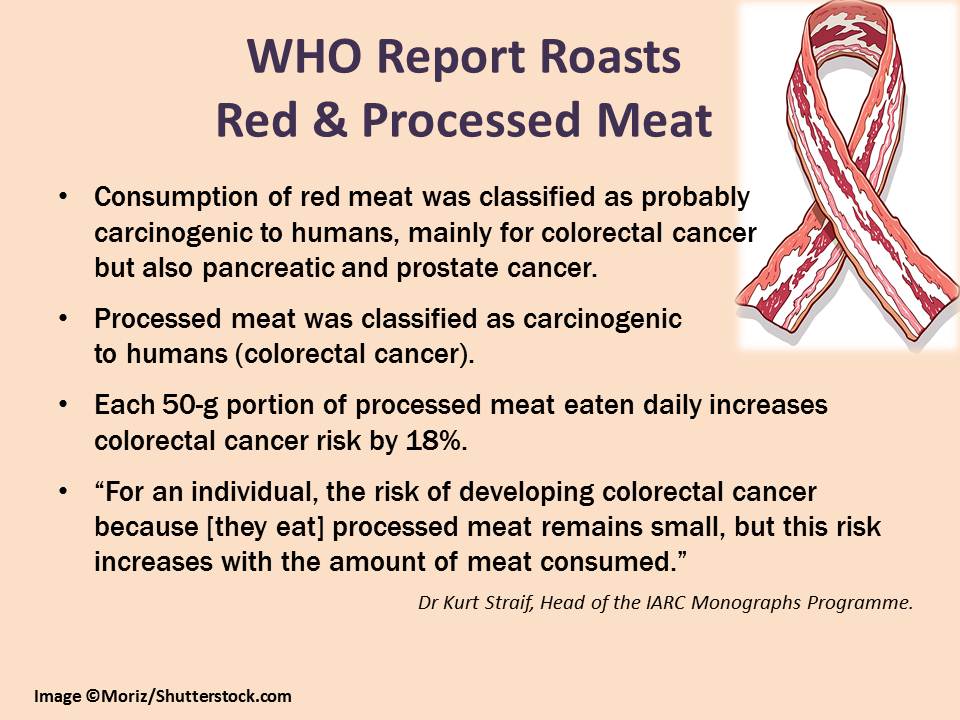
WHO Report Roasts Red and Processed Meat. Consumption of red meat was classified as probably carcinogenic to humans, mainly for colorectal cancer but also pancreatic and prostate cancer.Processed meat was classified as carcinogenic to humans (colorectal cancer). Each 50-g portion of processed meat eaten daily increases colorectal cancer risk by 18%. “For an individual, the risk of developing colorectal cancer because [they eat] processed meat remains small, but this risk increases with the amount of meat consumed.” Dr Kurt Straif, Head of the IARC Monographs Programme.
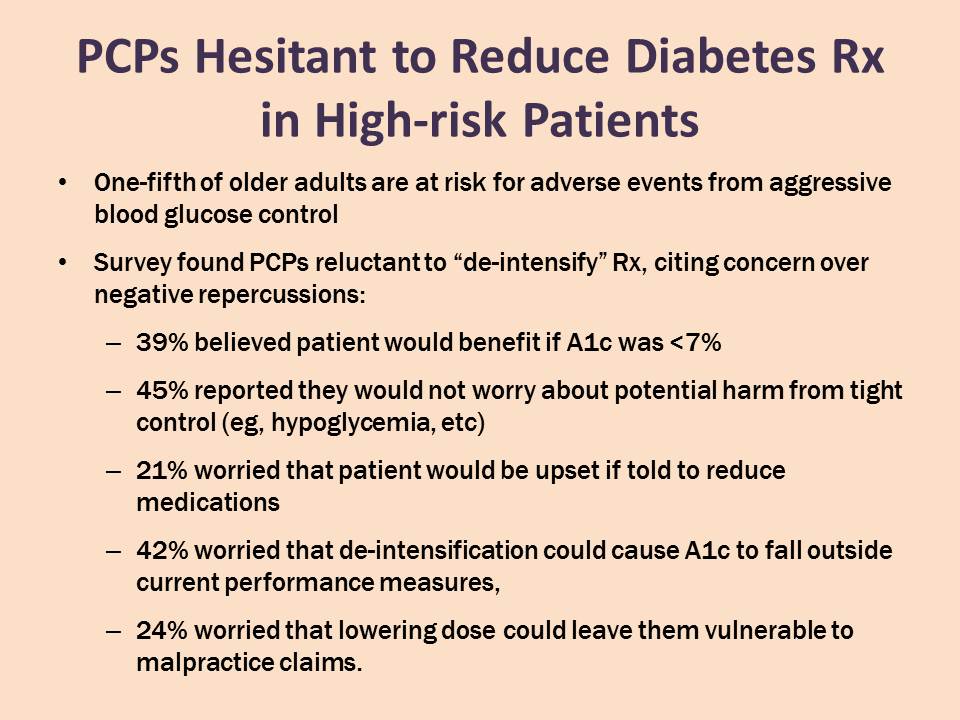
PCPs Hesitant to Reduce Diabetes Rx in High-risk Patients. One-fifth of older adults are at risk for adverse events from aggressive blood glucose control. Survey found PCPs reluctant to “de-intensify” Rx, citing concern over negative repercussions: 39% believed patient would benefit if A1c was lower than 7%; 45% reported they would not worry about potential harm from tight control (eg, hypoglycemia); 21% worried patient would be upset if told to reduce medications; 42% worried de-intensification could cause A1c to fall outside current performance measures; 24% worried lowering dose could leave them vulnerable to malpractice claims.
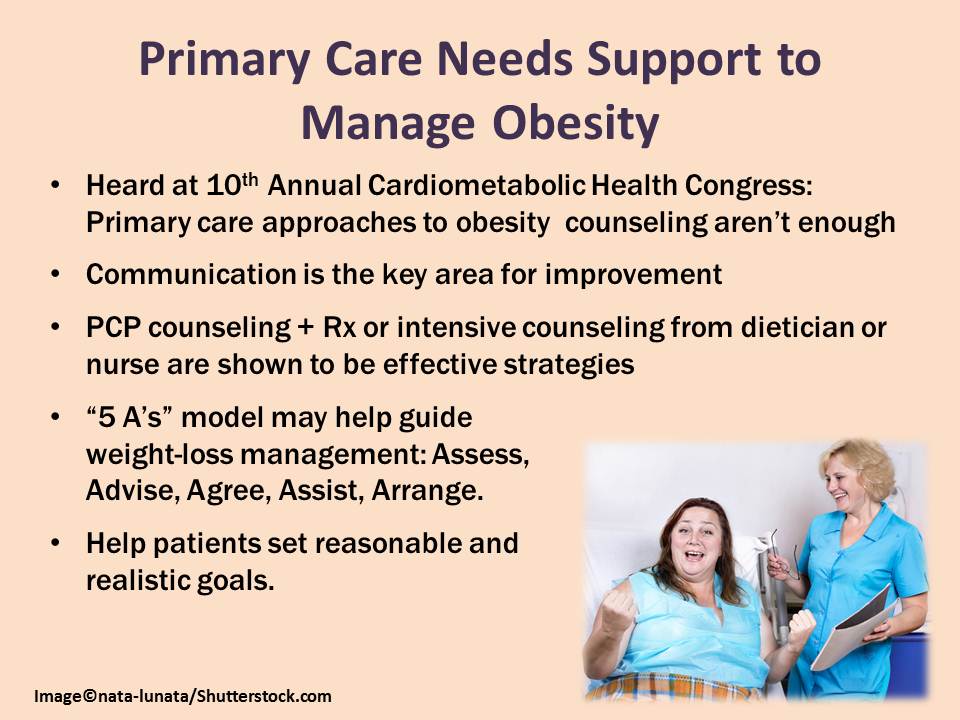
Primary Care Needs Support to Manage Obesity. Heard at 10th Annual Cardiometabolic Health Congress: Primary care approaches to obesity counseling aren’t enough. Communication is the key area for improvement. PCP counseling + Rx or intensive counseling from dietician or nurse are shown to be effective strategies. “5 A’s” model may help guide weight-loss management: Assess, Advise, Agree, Assist, Arrange. Help patients set reasonable and realistic goals.
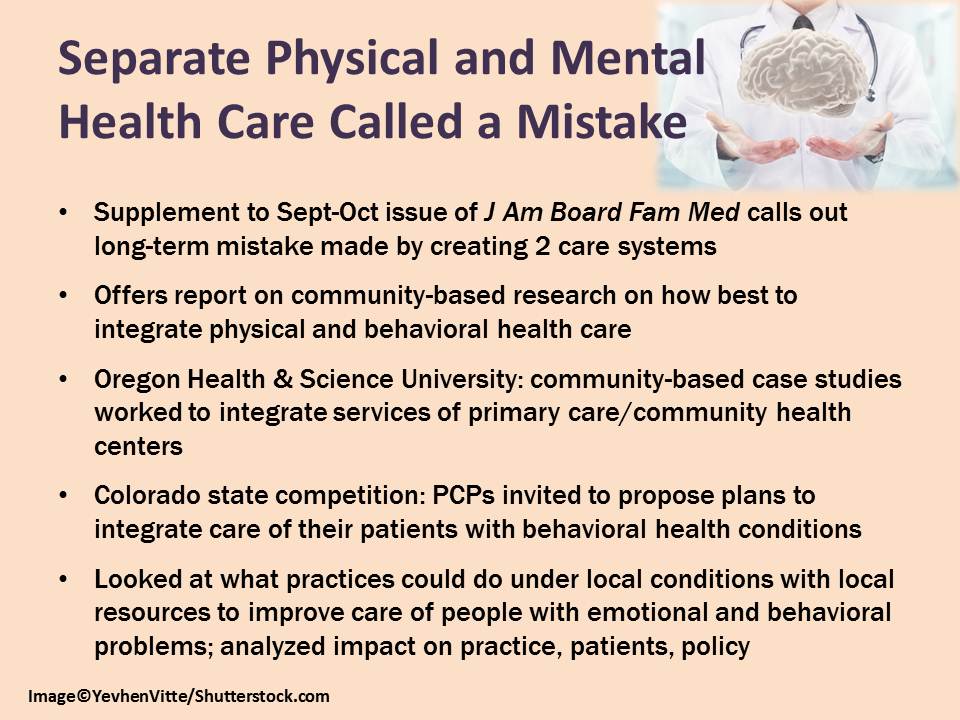
Separate Physical and Mental Healthcare Called a Mistake. Supplement to Sept-Oct issue of J Am Board Fam Med calls out long-term mistake made by creating 2 care systems. Offers report on community-based research on how best to integrate physical and behavioral health care from Oregon Health & Science University: community-based case studies worked to integrate services of primary care/community health centers. Colorado state competition: PCPs invited to propose plans to integrate care of their patients with behavioral health conditions. Looked at what practices could do under local conditions with local resources to improve care of people with emotional and behavioral problems; analyzed impact on practice, patients, policy.
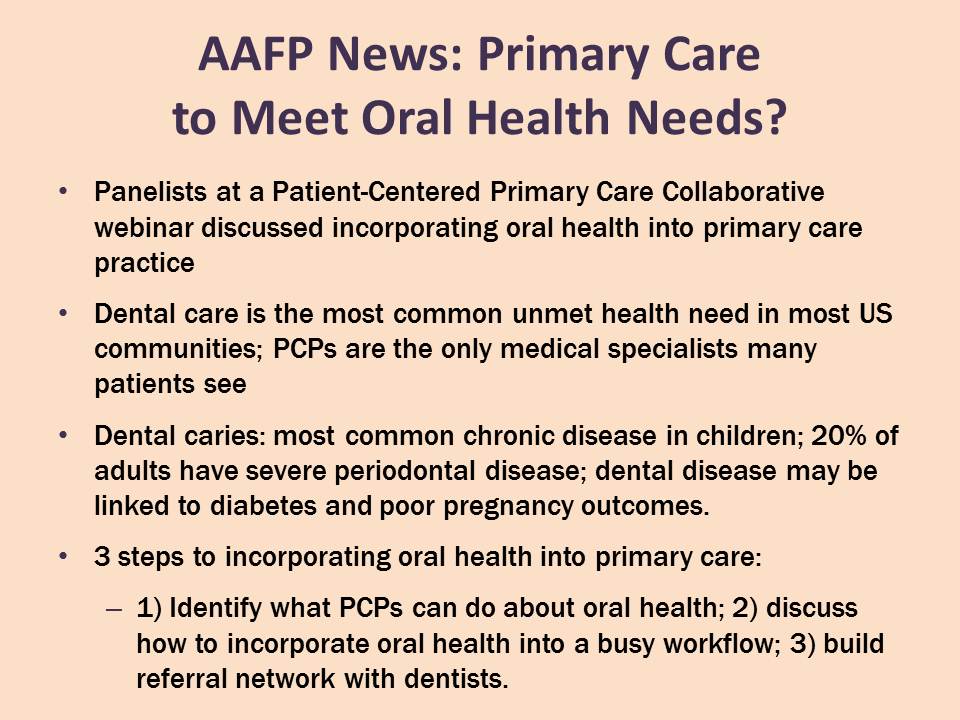
AAFP News: Primary Care to Meet Oral Health Needs? Panelists at a Patient-Centered Primary Care Collaborative webinar discussed incorporating oral health into primary care practice. Dental care is the most common unmet health need in most US communities; PCPs are the only medical specialists many patients see. Dental caries is most common chronic disease in children; 20% of adults have severe periodontal disease; dental disease may be linked to diabetes and poor pregnancy outcomes. 3 steps to incorporating oral health into primary care: (1) identify what PCPs can do about oral health, (2) discuss how to incorporate oral health into a busy workflow, (3) build referral network with dentists.
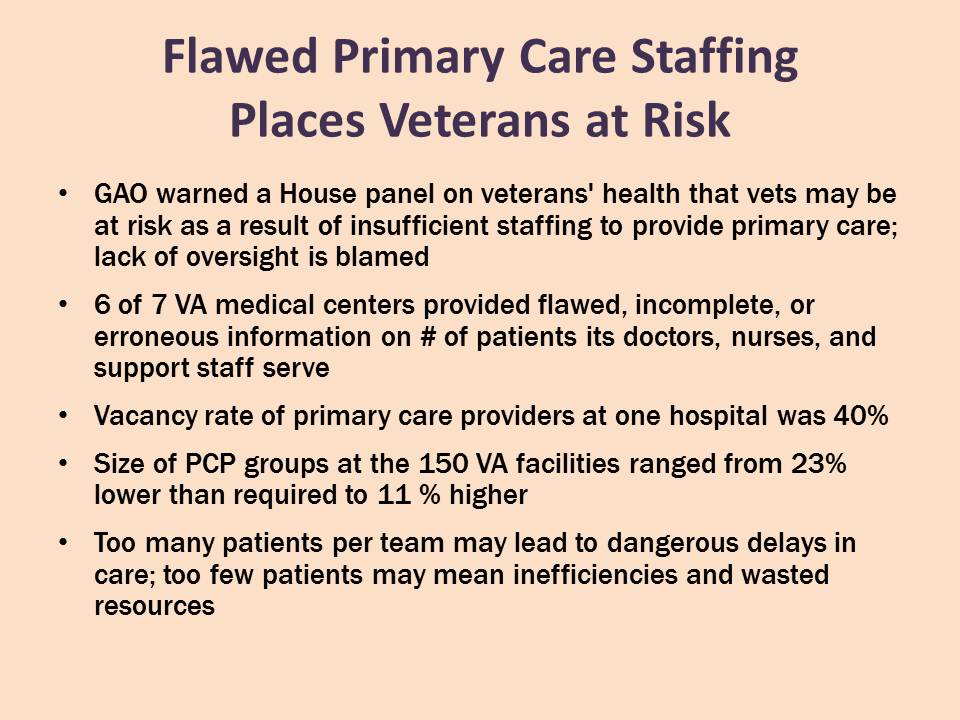
Flawed Primary Care Staffing Places Veterans at Risk. GAO warned a House panel on veterans' health that vets may be at risk as a result of insufficient staffing to provide primary care; lack of oversight is blamed. 6 of 7 VA medical centers provided flawed, incomplete, or erroneous information on # of patients its doctors, nurses, and support staff serve. Vacancy rate of primary care providers at one hospital was 40%. Size of PCP groups at the 150 VA facilities ranged from 23% lower than required to 11% higher. Too many patients per team may lead to dangerous delays in care; too few patients may mean inefficiencies and wasted resources.
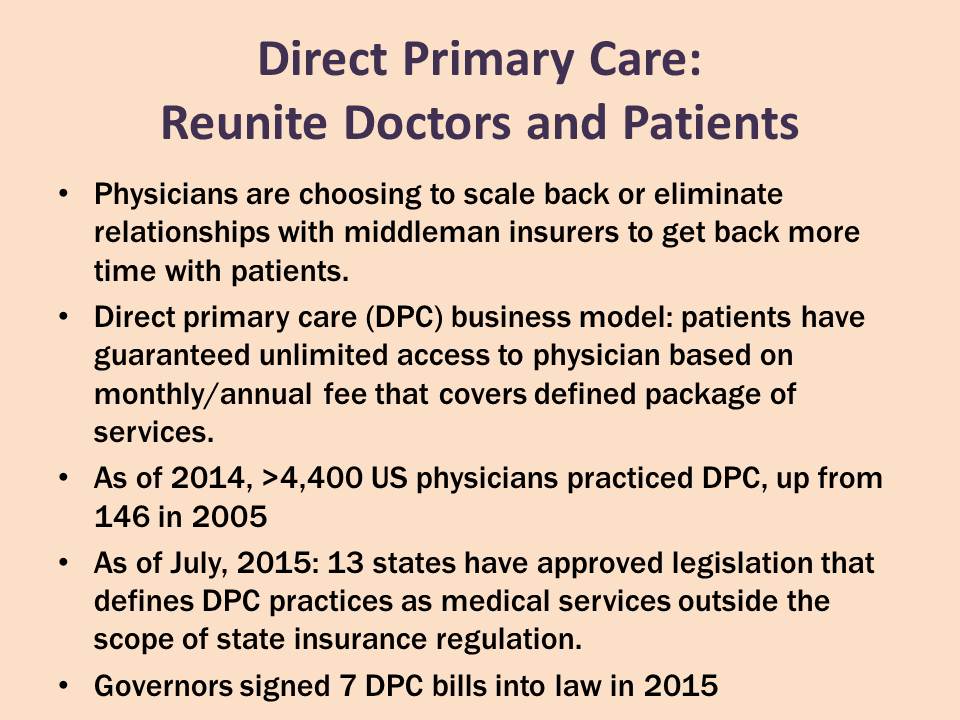
Direct Primary Care: Reunite Doctors and Patients. Physicians choosing to scale back or eliminate relationships with middleman insurers to get back more time with patients. Direct primary care (DPC) business model: patients have guaranteed unlimited access to physician based on monthly or annual fee that covers defined package of services. As of 2014, more than 4400 US physicians practiced DPC, up from 146 in 2005. As of July 2015: 13 states have approved legislation that defines DPC practices as medical services outside the scope of state insurance regulation. Governors signed 7 DPC bills into law in 2015.
Click through the slides above for quick summaries of notable things that happened in medicine this month.Â
References:
1. WHO Report Roasts Red & Processed Meat
2. PCPs Hesitant to Reduce Diabetes Rx in Patients at High-risk for Hypoglycemia
3. Primary Care Needs Support to Manage Obesity
4. Direct Primary Care: Reunite Doctors and Patients (Direct Primary Care Coalition)
5. Separate Physical and Mental Health Care Called a Mistake
6. AAFP News: Primary Care to Meet Oral Health Needs?
7. Flawed Primary Care Staffing Places Veterans at Risk
Related Content:




